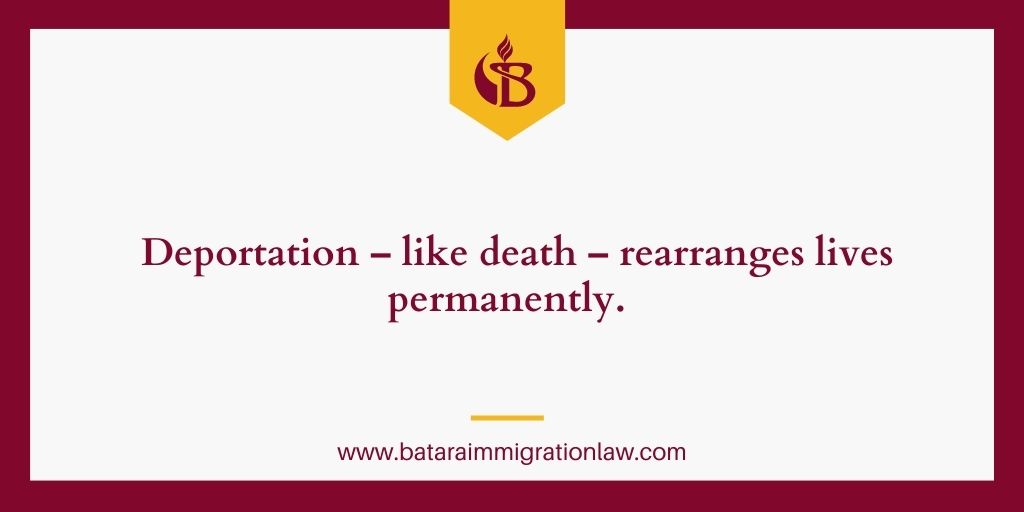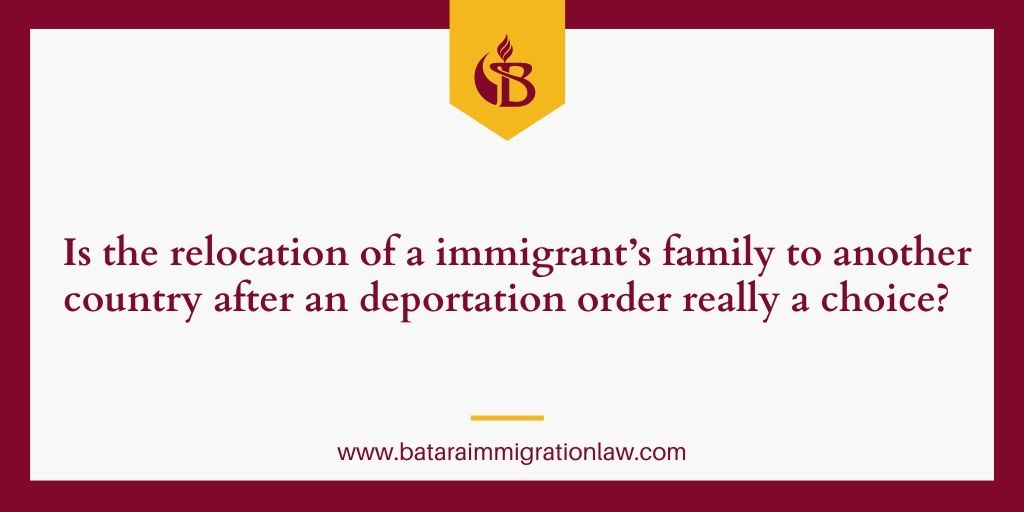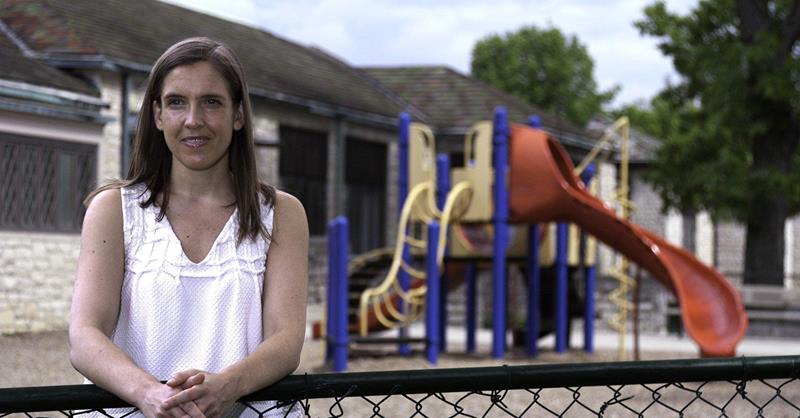
It makes many sick to their stomach and want to gag.
It can take years, if ever, for the agony to subside. The hurt gets into your soul, lingering in the backdrop to your daily activities, and there’s no running away from the incessant mental anguish.
Deportation is unforgiving.
For spouses of immigrants, the moment a husband or wife is ordered to be deported is similar to the fateful juncture when a loved one is declared deceased.
They must instantly begin to address and undergo emotionally painful adjustments in their lives they were hoping to never experience.
Deportation – like death – rearranges lives permanently.

Family Relocation After Deportation Is A Choice, Or Is It?
Deportation forces spouses of immigrants to choose – after losing their cancellation of removal hearing – to choose between two horrible options.
The family must decide if they are going to remain a family unit, in which case they will all move to the immigrant’s home country, even if it is a place they have never visited.
Or if they are going to live separate, with the U.S. citizen parent remaining in the United States.
FAMILY SEPARATION
“Should I Stay?”
FAMILY RELOCATION
“Should I Go?”
And if the couple has children, there’s a second equally distasteful choice that must be made.
“If I go with my husband, should I take our U.S. citizen children?”
In my experience as a San Bernardino immigration lawyer, I’ve seen more mixed-status immigrant families opt for the permanent separation scenario.
They worry that life for their United States-born children will be better here than in another country and they do not want their children to lose such advantages.
Yet, many spouses of deported immigrants take the opposite approach – choosing to stay together as a family unit, even though it means they must move to a country foreign to the U.S. citizen children and spouse.
In such situations, living abroad, the U.S. children are going to experience some relocation setbacks that can impact them for many, many years.
Calling this decision, in reality, a choice is really a misnomer. After all, is the relocation of a immigrant’s family to another country after an deportation order really a choice?

The Struggles Of United States Citizen Children Living Abroad In A Foreign Environment
Unfortunately, few studies have focused on what happens to the U.S. family members after relocation.
This causes problems of proof in defense cases revolving around cancellation of removal for non-permanent residents at immigration court.
In case after case that rely on a showing of a stringent level of hardship imposed on the qualifying relatives of an immigrant facing removal from the U.S., the absence of objective evidence undermines many otherwise strong claims for relief.
As a result, I was instantly interested in a Columbus Dispatch news article that shared the findings of a recent study shedding light on the impact of U.S. children who move to the home country of their deported parent.
Having practiced deportation defense for over twenty years, I believe this study can help support claims of exceptional and extremely unusual hardship to your qualifying family members at your immigration court merits hearing.
(For information on family separation issues, see Immigration LIVE, Episode 6.)
The Ohio State Study On Relocation
This subject matter was the basis of a recent ten-month by Ohio State Professor Sarah Gallo, who lived in a small town in Mexico and followed the progress of various children, born in the U.S., attending elementary school abroad.
Deportees’ US-born kids struggle in Mexican Schools

DISPATCH.COM
Professor Gallo made three significant findings:
First, the majority of the U.S. born children struggled academically in school. Even though some could speak Spanish, few could read or write Spanish. Since there are no classes similar to the ESL classes in the United States, there was no tutoring available.
Second, the students were not active in school. Many of them were subjected to ridicule, teasing, and being left out of classroom activities. The more that the United States citizen children exhibited American behavior, the more likely they were to undergo such isolation.
Third, as a combination of the first two factors, many of the children that she followed had to repeat grades.
The Impact Of Relocation On U.S. Children After Deportation Of Immigrant Parents
The findings of Professor Sarah Gallo are neither surprising nor shocking. As an attorney who has handled numerous cancellation of removal cases, I have realized the points she makes is known by immigrants. They left their countries to arrive in the United States, in the hopes of finding a more stable environment.
They grasp the world into which their U.S. born spouse and children will be forced to live in. But for many of them, it is hard to express what they anticipate will happen to their family, which is suddenly trasported to a country about which they know little, if anything.
The Ohio State study, however, should not be used to simply present Gallo’s findings.
Rather, the issues she verifies can be used to amplify the same types of concerns in your case. Towards that end, here are the most common matters that are present in nearly all immigration hardship cases, where relocation is a key factor of the judge’s decision.
Education
As the Ohio State study illustrates, to suddenly transport children from the United States to another country, where they have no roots, is almost certain to lead to educational problems.
Even if the children are high-achievers in their U.S. classes, without strong fluency in their new country’s language, they will struggle with classroom and homework assignments. This problem is compounded if the children’s immigrant parents have weak academic backgrounds or the country does not offer “Second Language” assistance for school-age children.
Socialization
It is not uncommon for children to be the subject of teasing, isolation, and left out of the inner circles of students at their new schools. In many instances, the more “Americanized” a child is, the more harshly they may be ridiculed and called names. This is not surprising because such behavior is similar to what immigrants who come to the United States face from their American peers.
Psychological Trauma
The effects of being left out, isolation, and feeling discriminated by peers can often affect the U.S. children for many years. These experiences in their new home, coupled with the loss of all that they were familiar with in the United States – the loss of friends, the loss of family, the loss of community – will impact their adjustment to a new culture.
As the children grow older, some will continue to experience a sense of “difference” and “resentment”, leading to some of these children to move back to the U.S. with relatives or, when they are old enough, return to the United States alone. Such actions, of course, will cause them to separate with the family members living in the foreign country abroad.
Country Conditions
In various countries, there is turmoil that is more prevalent and out-of-control than in the U.S. As a result, the U.S. born children may be exposed to poverty, gangs, crime, and violence they had never experienced. This type of social environment could lead to the children wanting to fit in, to be influenced by such activities, or wanting to stay far away from these types of actions, to become the victims of crime and violence.
Here is the key take-away. If you’re an immigrant, the impact of relocation is an issue that you want to discuss as part of your hardship defense at your immigration court case.
The various points raised by Professor Gallo’s study can open to more issues how your minor children will be heavily affected by, should you have to move back to your home country.
To present your best case possible, you must discuss these types of impacts on your children at your hearing, and ensure the judge weighs each and every one fully.
By Carlos Batara, Immigration Law, Policy, And Politics






